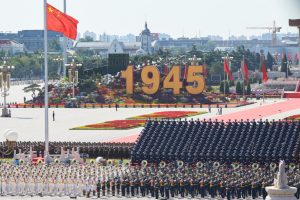Eighty years after the guns fell silent in the Pacific theater of World War II, the region it reshaped continues to remember – and forget – in strikingly different ways.
In China, the memory has never faded. A major military parade is scheduled for September 3, marking the victory over Japan with full state ceremony. Today’s youth, born generations after the war, know its details intimately – not just from family stories, but from textbooks, museum visits, battlefield reenactments, and cinema. The most popular film of the summer is “Dead to Rights,” a graphic portrayal of the Nanjing Massacre.
For the Chinese Communist Party (CCP), the war’s memory is not just history – it is ideology, identity, and political capital.
In the United States, by contrast, the war in Asia has largely slipped from public consciousness. Few young Americans today know the names of Guadalcanal or Iwo Jima, or understand the critical role their grandfathers played in ending the Japanese Empire in East and Southeast Asia. In March 2025, U.S. Secretary of Defense Pete Hegseth controversially praised the valor of Japanese troops during an 80th anniversary speech on Iwo Jima, saying that “the Japanese commander, General Kuribayashi, led his soldiers and sailors with stoicism, determination, and bravery.” American WWII veterans might have been stunned to hear such words, yet the speech drew more attention for Hegseth’s rollback of DEI (diversity, equity, and inclusion) policies than for the memory of the war itself.
In Taiwan, 2025 also marks 80 years since the island’s return to China at the end of the war – a historical milestone largely omitted in official commemorations. President Lai Ching-te framed the anniversary not as a liberation from empire, but as a warning to democracies: “Just as Europe once faced fascist aggression, Taiwan now confronts authoritarian coercion.” In his August 15 speech, Lai did not mention Japan even once, nor did he address Japan’s colonial rule on the island. The omission is telling. In today’s politics, the history of Taiwan’s “return” to mainland rule is inconvenient – its historical narrative has shifted away from anti-imperial liberation toward democratic self-definition.
In Japan, memory is again contested and sensitive. In his speech at the 80th anniversary ceremony on August 15, 2025, Japanese Prime Minister Ishiba Shigeru chose his words carefully. He expressed “remorse” – but notably stopped short of offering a direct apology for Japan’s wartime aggression against its Asian neighbors.
A recent poll reported by The Tokyo Shimbun revealed a striking insight into Japan’s current historical consciousness: only 42 percent of Japanese respondents consider the Pacific War to be a war of aggression, while 12 percent view it as a war of self-defense, and 44 percent say they either don’t know or hold no clear opinion. Even 80 years later, more than half of the Japanese public remains unwilling to recognize the war as one of invasion.
As the saying goes: history is always contemporary, and memory is always selective. Eighty years is both long and short. For those who witnessed the war’s end, today’s world – where the memory of the conflict is institutionalized in some places and ignored in others – might be unrecognizable. But history in East Asia is never just history. It is weaponized, re-scripted, and deeply entangled in present-day struggles for legitimacy, identity, and power.

































